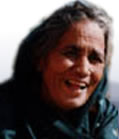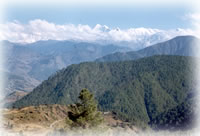 |
 |
||
 |
|||
|
RELATED THEMES communications employment and income spiritual beliefs OTHER LOCAL THEMES BACKGROUND |
tourism
Today, the number of visitors has dramatically increased and most travel by car or bus, not on foot like the pilgrims of the past. Villages that used to earn income providing food and lodging to the walkers are now bypassed, so a number of narrators are already familiar with the phenomenon that if the tourist industry expands, it is not necessarily local people who benefit. They have also seen what a difference scale can make: many express unease that the sacred sites have become crowded and surrounded by shops and non-vegetarian restaurants that detract from the religious atmosphere. India 9 has much to say on this: "At present holy shrines are being looked at as the best spots for tourism. It has certainly diminished the faith in those shrines. It has also caused some change in our feelings towards them. People go to these shrines as tourists and defile their sanctity. They don't value their dignity and honour.we should protect their religious values." He doesn't want to get rid of tourism completely, however, and has faith that local people can set a good example and attract more visitors: ".we should project the beauty and the importance of tourist spots through mass-communication media. The good behaviour of the local people will increase the number of tourists." To many in the hills, development of tourism does appear to offer one of the most obvious income-generating opportunities, but opinions vary. Some look forward to an increase in visitors, especially the spiritually motivated and those seeking relaxation and nature. India 10 discusses different kinds of tourism and expresses concern that whatever the economic benefits, there will be greater social disruption: "People [think] that if tourism develops in the hills then it will bring employment to the people here and it will bring money, and they have limited their understanding of tourism to this. But. Under the cover of tourism, will such enterprises mushroom which will destroy our very culture? . before promoting tourism we must think about these things so that tomorrow there is not a body blow to the culture of the hills, that we do not have to start a new movement - 'Stop such tourism'." Finally, he warns: "If tourism is developed properly then there can be economic development here, but if it continues like this then we will get nothing more than carrying the luggage of these tourists. They will give us some money and make fun of us." quotes about tourism"Government.plans are to openly invite the 'five star' culture. Hence big hotels are being constructed, so are airstrips. This is not going to bring any development for locals. It is the western style of tourism. What we need to encourage is spiritual tourism in this area, as a special place for pilgrimage. So people should come here for peace and tranquillity. But people who come here with material and physical pleasure in mind cause more damage to the natural surroundings as well as to the local culture." "In the past people used to walk on foot to the shrines. It took months for the completion of a single visit to a shrine.Today people go there not as pilgrims but as tourists. They sit in the vehicle and get down at the shrine. No communication and interaction take place in between; no mutual understanding among the local and the outsiders." "It is good the people come here from outside. We feel no trouble. They come to visit our Uttarakhand. This is a holy place.They come from a long distance to visit the shrines. All have an equal right to reach their shrines." "I feel that there should be restrictions [on pilgrims] and nobody should be allowed to go beyond a certain point [on the river]. The priests of the Ganga are also aware of.what the river looked like earlier and.what its condition is now and the reason. It was very clean. There used to be a temple. Beneath it two rows of houses and some shops. Now it is completely over-crowded. There is filth right up to the Ganga. There are hotels all over. How can we call the Ganga holy?" |
|
 The Himalaya have long been known as Dev-bhumi - "the land of the gods" - and these narrators live in a region particularly famed for its religious sites and connections. "Spiritual tourism", yatras or pilgrimage, go back to antiquity: it was considered the religious duty of every Hindu to visit at least four such sacred sites in a lifetime. People used to walk for years from all parts of India to reach their ultimate destination.
The Himalaya have long been known as Dev-bhumi - "the land of the gods" - and these narrators live in a region particularly famed for its religious sites and connections. "Spiritual tourism", yatras or pilgrimage, go back to antiquity: it was considered the religious duty of every Hindu to visit at least four such sacred sites in a lifetime. People used to walk for years from all parts of India to reach their ultimate destination.